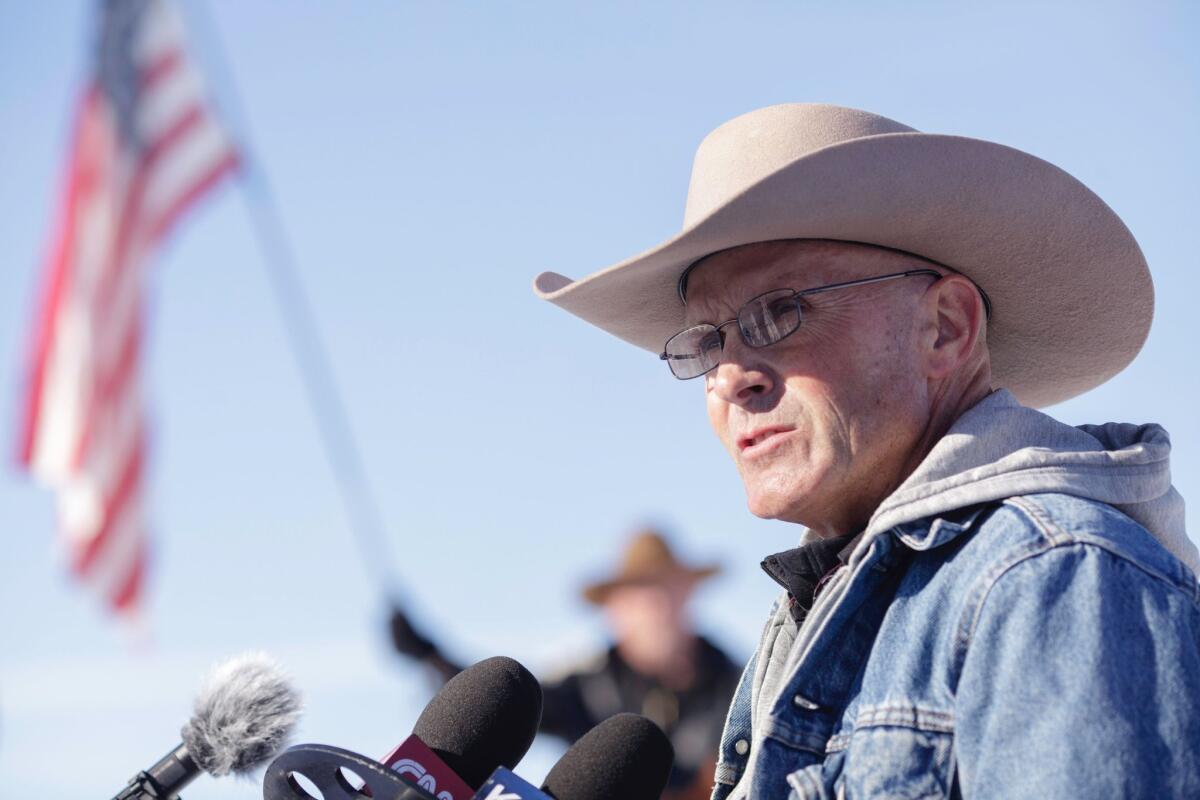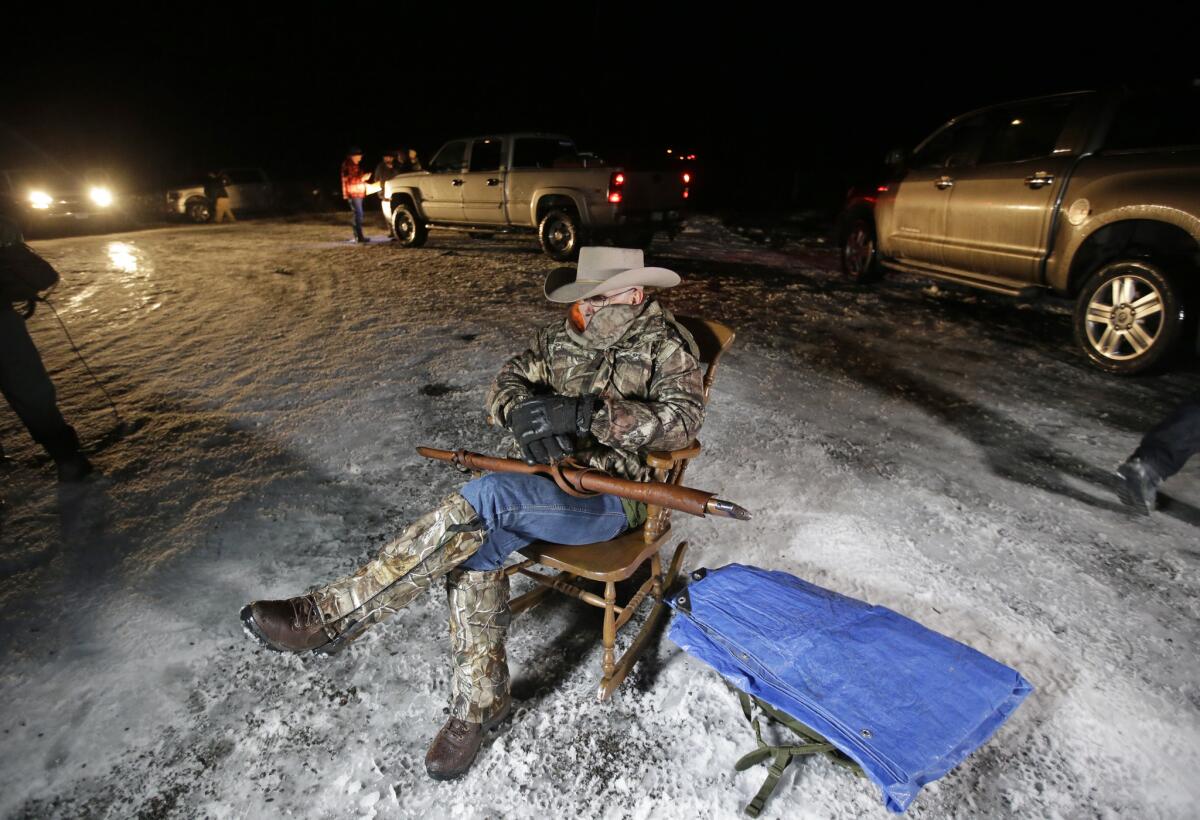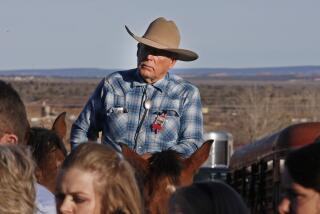Man killed in Oregon standoff had preached what he called a ‘cowboy’s stand for freedom’

Robert “LaVoy” Finicum, who often served as a spokesman for armed occupiers of the Malheur National Wildlife Refuge, was killed Tuesday in an altercation with federal authorities.
- Share via
Where some activists at an occupied federal wildlife refuge preached rowdyism and brimstone, Robert “LaVoy” Finicum was wistful, almost sad.
Bedecked in his trademark earmuffs and cowboy hat, the Arizona rancher would wonder aloud with a shake of his head why reporters couldn’t simply see the rightness of his position: that the federal government was illegally possessing land it had no right to take.
He insisted he and the other occupiers were helping the people of Harney County, Ore. He often carried a handgun at his side and sometimes set up watch with a long gun across his lap.
Join the conversation on Facebook >>
He maintained a blog — “One Cowboy’s stand for Freedom” — in which he posted videos of himself denouncing the federal government and demanding that federal land be turned over to local authorities and private ranchers. He also wrote a novel, a post-apocalyptic Western thriller called “Only By Blood and Suffering.”
Finicum, 55, was killed Tuesday night by an Oregon State Police trooper during an altercation between authorities and some who had occupied the Malheur National Wildlife Refuge. About 20 occupiers have squatted for more than three weeks while they protested the incarceration of a father-and-son pair of ranchers and demanded federal agencies leave the land to local authorities and landowners.
The circumstances of the altercation have not yet been released, but FBI Special Agent in Charge Greg Bretzing said at a news conference on Wednesday that police were attempting to take Finicum into custody.
“Let me be clear: It is fully and unequivocally the behavior and the choices made by the armed occupiers that have led us to where we are today,” Bretzing said. “And, as the FBI and our partners have demonstrated, actions are not without consequences.”
Finicum’s son, Robert C. Finicum of Provo, Utah, declined to comment when contacted on Wednesday. Arianna Finicum Brown, 26, one of Finicum’s 11 children, told the Oregonian on Tuesday, “My dad was such a good, good man, through and through. He would never ever want to hurt somebody, but he does believe in defending freedom and he knew the risks involved.”
On Wednesday evening, about two dozen people held a brief vigil for Finicum in tiny downtown Burns, a town near the refuge, walking several blocks along Broadway while holding candles. Tony Atencio, 32, carried a sign with a photograph of Finicum above the words “#All Lives Matter.”
“This man stood up to fight for all Americans, not just Harney County,” Atencio said. “He is the spokesman for what America should be.”
Atencio said that he was not one of the occupiers but that he supported them, once by delivering donated pizza to the refuge.
During the occupation, Ammon Bundy, putative leader of the activists, often was gruff and dismissive when talking to the media or public. Jon Ritzheimer, a Phoenix-area anti-Muslim activist who, like Bundy, was arrested Tuesday, would stay silent for long stretches before exploding in anger. But Finicum kept his cool.

Arizona rancher Robert “LaVoy” Finicum keeps watch Jan. 5 during the occupation of Malheur National Wildlife Refuge in Oregon.
“I can point to the page, here,” Finicum told the Los Angeles Times during the second week of the occupation, holding aloft a pocket Constitution. “I can tell you where to look if you want to see why we’re here.
“You say we’re breaking things up. [But] we’re keeping something together here.”
Though he was soft-spoken, Finicum was as hard-line as his comrades in arms.
In his writings and in videos posted to his blog, Finicum feared that the federal government was preparing to take away his guns, and highlighted President Obama’s National Defense Resources Preparedness executive order, which allows the U.S. government to “to take actions necessary to ensure the availability of adequate resources and production capability,” which Finicum read as permission to seize his assets.
One night during the standoff, Finicum decided to make a stand by sitting down. After hearing a rumor that there was a warrant for his arrest, Finicum declared himself willing to be arrested and took up a position at the mouth of the camp’s entrance, sitting on the ground and under a tarp, as if were a blanket.
There he stayed for a good part of the night, with his tarp and his pocket copy of the Constitution. It was almost certainly a publicity move, one that earned him the moniker “Tarp Man” on Twitter.
Finicum often served as a spokesman for the group, reading statements into cameras and then chatting with reporters when the cameras were off. He told reporters that the occupiers were going through federal files looking for proof of federal malfeasance.
One day with reporters watching, he scaled a ladder to the top of a telephone pole to remove a camera lens. He later held it up for reporters, saying it had been placed by the FBI to monitor the occupiers.
Finicum was, for most of his life, a rancher who paid his grazing fees to the federal government. He declared bankruptcy in 2002 with his wife, Dorthea, on a New Mexico business called Southwest Horse and Trails.
Nine years later, in 2011, Finicum had relocated to Arizona and obtained loans from the Farm Services Agency from both Arizona and Utah — his ranch near Colorado City, Ariz., is near the Utah border in a heavily Mormon part of the state. He put up as collateral all of his crops, equipment and inventory.

Robert “LaVoy” Finicum died during a clash between law enforcement and his group during a traffic stop. Finicum told the Associated Press in early January that the occupation of a wildlife refuge was “intended to be peaceful.” He also said, indicati
Finicum said that his outlook began to change regarding his own grazing fees and the vast swaths of land owned by the federal government when Nevada rancher Cliven Bundy refused to pay $1 million in fees and faced off with federal agents who had rounded up cattle he let graze on federal land.
The Bundys claimed that federal land was essentially theft by bureaucrats in Washington, D.C., from the citizens of the West. They were determined to undo the federal possession of land that had once been purchased by the United States.
The Bundys also subscribe to the belief espoused by a faction of Mormons that the United States is a Christian nation gifted to the people of the West by a Christian god. The federal government’s possession of the land, they say, flies in the face of the will of their god.
Shown the possibilities of avoiding paying grazing fees and an ostensible constitutional grounding that meshed with his religious values, Finicum proceeded with the zeal of a convert. He recorded a series of videos he posted to his own blog. The recurring theme: the overreach of government and how it infringed on individual freedom.
“Hello everyone, this is LaVoy Finicum,” he began his last video, posted Dec. 17. “To the degree that us individuals are dependent on any government … for our food, our water, our shelter, to that degree, we’re not free.”
Finicum advised viewers to prepare for a year without food — a suggestion popular among “doomsday preppers,” those who believe the biblically foretold end times are coming, and the righteous must be prepared to survive for a time without help.
Pointing to his supplies, including 300 pounds of wheat for $70 and 100 pounds of rolled oats for $45, he smiled.
“There’s not a lot of variety, you’re going to get tired of it,” he said. “But it keeps body and soul together.”
Finicum joined Cliven Bundy at the Nevada ranch for the 2014 standoff, and he was one of the earliest to join Cliven’s sons Ammon and Ryan in Burns, Ore., in December, when they began the first protests in support of Dwight and Steven Hammond, the ranchers sent to prison in early January.
When a group of about 15 men broke off from a protest in support of the Hammonds to occupy the Malheur National Wildlife Refuge on Jan. 2, Finicum wasn’t far behind.
Finicum indeed told reporters he would die before he went to prison, but like most other activists, said he wasn’t seeking a violent end to the occupation.
According to Talking Points Memo, his novel, “Only by Blood and Suffering,” uses the boogeymen of the conservative movement — the U.S. government, China and terrorists — as foils to the main characters. In 241 pages, Finicum’s characters endure series of calamities and try to reach a family member’s ranch as they escape San Diego.
Hamstrung by the government’s ban on guns and his own lack of preparation, one character chastises himself for not stocking up on food before the crisis began — a theme Finicum would repeat in his videos.
“A twinge of guilt pulled at me. What would dad think with me showing up at the ranch with so little food?” one character thinks to himself. “How many times had he told us kids to lay up stores and supplies?”
Times staff writer William Yardley in Burns, Ore. contributed to this report.
Twitter: @nigelduara
ALSO
2 dead, 3 wounded at Seattle homeless camp shooting
O.C. jail escapee was ordered deported in 1998 but remained in U.S.
Gov. Brown to announce ballot measure to ease mandatory prison sentences
More to Read
Sign up for Essential California
The most important California stories and recommendations in your inbox every morning.
You may occasionally receive promotional content from the Los Angeles Times.














